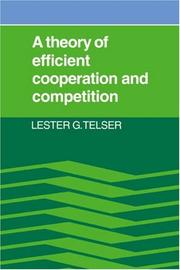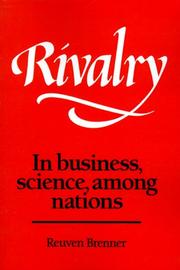| Listing 1 - 8 of 8 |
Sort by
|
Book
ISBN: 0444702326 Year: 1987 Publisher: Amsterdam North-Holland
Abstract | Keywords | Export | Availability | Bookmark
 Loading...
Loading...Choose an application
- Reference Manager
- EndNote
- RefWorks (Direct export to RefWorks)
Competition. --- Standardization --- 658.81 --- Industrial engineering --- Grading --- Mass production --- Specifications --- Testing --- Competition --- Competition (Economics) --- Competitiveness (Economics) --- Economic competition --- Commerce --- Conglomerate corporations --- Covenants not to compete --- Industrial concentration --- Monopolies --- Open price system --- Supply and demand --- Trusts, Industrial --- 658.81 Sales organization --- Sales organization --- Economic aspects --- Telecommunication services

ISBN: 0710802218 0710802579 9780710802576 9780710802217 Year: 1987 Publisher: Brighton: Wheatsheaf books,
Abstract | Keywords | Export | Availability | Bookmark
 Loading...
Loading...Choose an application
- Reference Manager
- EndNote
- RefWorks (Direct export to RefWorks)
Microeconomics --- Corporations --- Production (Economic theory) --- Entrepreneurship --- Competition --- AA / International- internationaal --- 338.040 --- Ondernemingen: algemeenheden. --- Supply and demand --- Demand (Economic theory) --- Supply-side economics --- Entrepreneur --- Intrapreneur --- Capitalism --- Business incubators --- Business corporations --- C corporations --- Corporations, Business --- Corporations, Public --- Limited companies --- Publicly held corporations --- Publicly traded corporations --- Public limited companies --- Stock corporations --- Subchapter C corporations --- Business enterprises --- Corporate power --- Disincorporation --- Stocks --- Trusts, Industrial --- Competition (Economics) --- Competitiveness (Economics) --- Economic competition --- Commerce --- Conglomerate corporations --- Covenants not to compete --- Industrial concentration --- Monopolies --- Open price system --- Ondernemingen: algemeenheden --- Economic aspects

ISBN: 0521306191 0521022207 051152837X 9780521306195 9780511528378 9780521022200 Year: 1987 Publisher: Cambridge: Cambridge university press,
Abstract | Keywords | Export | Availability | Bookmark
 Loading...
Loading...Choose an application
- Reference Manager
- EndNote
- RefWorks (Direct export to RefWorks)
This 1987 book looks at competition, attacking the notion that competition always leads to good results and that more competition is better. It also attacks the notion that cooperation is always harmful. An efficient economic equilibrium requires an optimal combination of both cooperation and rivalry. Telser first examines the genesis of certain late nineteenth-century laws that affected competition in the United States. Going on to give theoretical insights into cooperation and rivalry, he shows when unrestricted competition can lead to an efficient equilibrium, as well as when restrictions on competition can provide for the same. The tensions between these two forces are especially pertinent to the study of innovation - the more costly it is to protect the property rights of ideas, the greater is the reliance on secrecy, and hence, the more likely is the wasteful duplication of results.
Microeconomics --- Quantitative methods (economics) --- Competition --- Cooperation --- Mathematical models --- 330.1 --- -Competition (Economics) --- Competitiveness (Economics) --- Economic competition --- Commerce --- Conglomerate corporations --- Covenants not to compete --- Industrial concentration --- Monopolies --- Open price system --- Supply and demand --- Trusts, Industrial --- Economische grondbegrippen. Algemene begrippen in de economie --- 330.1 Economische grondbegrippen. Algemene begrippen in de economie --- -Economische grondbegrippen. Algemene begrippen in de economie --- -330.1 Economische grondbegrippen. Algemene begrippen in de economie --- Competition (Economics) --- Economic aspects --- Business, Economy and Management --- Economics --- Competition - Mathematical models --- Mathematical models.
Book
ISBN: 9282575942 9789282575949 Year: 1987 Publisher: Luxembourg: Office for official publications of the European Communities,
Abstract | Keywords | Export | Availability | Bookmark
 Loading...
Loading...Choose an application
- Reference Manager
- EndNote
- RefWorks (Direct export to RefWorks)
Industrial economics --- European Union --- Competition --- Deregulation --- Concurrence --- Déréglementation --- Industrial organization --- -Competition --- -Industrial organization --- -Industries --- Organization --- Industrial concentration --- Industrial management --- Industrial sociology --- Competition (Economics) --- Competitiveness (Economics) --- Economic competition --- Commerce --- Conglomerate corporations --- Covenants not to compete --- Monopolies --- Open price system --- Supply and demand --- Trusts, Industrial --- Industries --- Regulatory reform --- Industrial policy --- Trade regulation --- Law and legislation --- -Deregulation --- Economic aspects --- Déréglementation --- Industry and state --- European communities --- European Union countries --- Deregulation - European Economic Community countries --- Competition - European Economic Community countries --- Industrial organization - European Economic Community countries --- CONCURRENCE --- INDUSTRIELLE
Book
ISBN: 0631138463 9780631138464 Year: 1987 Publisher: Oxford: Blackwell,
Abstract | Keywords | Export | Availability | Bookmark
 Loading...
Loading...Choose an application
- Reference Manager
- EndNote
- RefWorks (Direct export to RefWorks)
Microeconomics --- Product strategy --- Product management --- Competition --- Prices --- Marketing --- 658.81 --- Brand management --- Management, Product --- Commercial products --- Commodity prices --- Justum pretium --- Price theory --- Consumption (Economics) --- Cost --- Costs, Industrial --- Money --- Cost and standard of living --- Supply and demand --- Value --- Wages --- Willingness to pay --- Consumer goods --- Domestic marketing --- Retail marketing --- Retail trade --- Industrial management --- Aftermarkets --- Selling --- Competition (Economics) --- Competitiveness (Economics) --- Economic competition --- Commerce --- Conglomerate corporations --- Covenants not to compete --- Industrial concentration --- Monopolies --- Open price system --- Trusts, Industrial --- Sales organization --- Management --- 658.81 Sales organization --- Economic aspects --- Competition.
Book
ISBN: 928256715X 9789282567159 Year: 1987 Volume: vol *368 Publisher: Luxembourg: Office for official publications of the European Communities,
Abstract | Keywords | Export | Availability | Bookmark
 Loading...
Loading...Choose an application
- Reference Manager
- EndNote
- RefWorks (Direct export to RefWorks)
Fixation des prix --- Fixation du prix --- Politique des prix --- Price policy --- Price policy [Industrial ] --- Pricing --- Prijsbepaling --- Prijspolitiek --- Prix -- Détermination --- Prix -- Fixation --- Prix de détail --- Prix de vente --- Retail pricing --- Tarification --- Competition --- Monopolies --- Predatory pricing --- Concurrence --- Monopoles --- Case studies --- Price cutting --- -Predatory pricing --- -Pricing --- Competition, Unfair --- Dumping (International trade) --- Competition (Economics) --- Competitiveness (Economics) --- Economic competition --- Commerce --- Conglomerate corporations --- Covenants not to compete --- Industrial concentration --- Open price system --- Supply and demand --- Trusts, Industrial --- Combinations in restraint of trade --- Commercial corners --- Corners, Commercial --- Engrossing --- Forestalling --- Commercial crimes --- Trade regulation --- Monopolistic competition --- Monopsonies --- Restraint of trade --- -Case studies --- Economic aspects --- -Competition --- Competition. --- Predatory pricing - Case studies

ISBN: 0887301851 Year: 1987 Publisher: Cambridge (Mass.) : Ballinger,
Abstract | Keywords | Export | Availability | Bookmark
 Loading...
Loading...Choose an application
- Reference Manager
- EndNote
- RefWorks (Direct export to RefWorks)
Competition --- Computer industry --- -New business enterprises --- Research, Industrial --- Semiconductor industry --- -Technological innovations --- -681.3*K1 --- Breakthroughs, Technological --- Innovations, Industrial --- Innovations, Technological --- Technical innovations --- Technological breakthroughs --- Technological change --- Creative ability in technology --- Inventions --- Domestication of technology --- Innovation relay centers --- Technology transfer --- Electronic industries --- Contract research --- Industrial research --- Research --- Engineering experiment stations --- Technological innovations --- Business starts --- Development stage enterprises --- How to start a business --- New companies --- Start-up business enterprises --- Start-up companies --- Start-ups (Business enterprises) --- Starting a business --- Startups (Business enterprises) --- Business enterprises --- Business incubators --- Competition (Economics) --- Competitiveness (Economics) --- Economic competition --- Commerce --- Conglomerate corporations --- Covenants not to compete --- Industrial concentration --- Monopolies --- Open price system --- Supply and demand --- Trusts, Industrial --- Economic aspects --- Computer industry: markets; standards; statistics; suppliers --- Competition. --- New business enterprises. --- Research, Industrial. --- Technological innovations. --- Economic aspects. --- 681.3*K1 Computer industry: markets; standards; statistics; suppliers --- New business enterprises --- 681.3*K1

ISBN: 0521385849 0521331870 0511559429 9780521331876 9780521385848 9780511559426 Year: 1987 Publisher: Cambridge: Cambridge university press,
Abstract | Keywords | Export | Availability | Bookmark
 Loading...
Loading...Choose an application
- Reference Manager
- EndNote
- RefWorks (Direct export to RefWorks)
Rivalry is an attempt to understand facets of entrepreneurial societies by integrating the economic analysis with historical, political and psychological considerations, customarily shunned by economists. The author argues that decisions to make new business ventures, and readiness to take risks are both related to concepts of ranking hierarchies on local, national or international levels. He then constructs a theory of business enterprise and of rivalry supported by evidence on entrepreneurship, innovation, advertising, all examined with their historical, political or organisational concerns. This notion of rivalry among businessmen is used to derive guidelines for anti-trust legislation. Instead of pricing, profitability, concentration ratios and other criteria used today to infer non-competitive behaviour, he suggests using a measure of a firm's relative rate of innovation to infer it. By extending the notion of rivalry to the political sphere, national and international, guidelines are derived to evaluate the performance of state-owned enterprises and to examine policies related to free trade.
Bedrijfsorganisatie (Economische theorie) --- Besluitvorming --- Besluitvormingsanalyse --- Besluitvormingsprocessen --- Competition --- Concurrence --- Concurrentie --- Deciding --- Decision analysis --- Decision making --- Decision processes --- Decision-making --- Décision [Prise de ] --- Décision [Théorie de la ] --- Industrial organization (Economic theory) --- Making decisions --- Management decisions --- Management--Beslissingen --- Management--Besluitvorming --- Management--Decision making --- Mededinging --- Organisation des entreprises (Théorie économique) --- Prise de décision --- Risico --- Risk --- Risque --- Théorie de la décision --- 338.040 --- 338.047 --- 338.6 --- 380.22 --- AA / International- internationaal --- Economics --- Uncertainty --- Probabilities --- Profit --- Risk-return relationships --- Industrial economics --- Market structure --- Microeconomics --- Decision (Psychology) --- Management --- Choice (Psychology) --- Problem solving --- Competition (Economics) --- Competitiveness (Economics) --- Economic competition --- Commerce --- Conglomerate corporations --- Covenants not to compete --- Industrial concentration --- Monopolies --- Open price system --- Supply and demand --- Trusts, Industrial --- Ondernemingen: algemeenheden --- Privé en openbare bedrijven. Openbare diensten. Gemengde economie --- Wetenschappelijk onderzoek en ontwikkeling --- Concurrentie. Monopolie, duopolie, oligopolie --- Economic aspects --- Organization theory --- Competition. --- Risk. --- Decision-making. --- Business, Economy and Management --- Decision making.
| Listing 1 - 8 of 8 |
Sort by
|

 Search
Search Feedback
Feedback About UniCat
About UniCat  Help
Help News
News